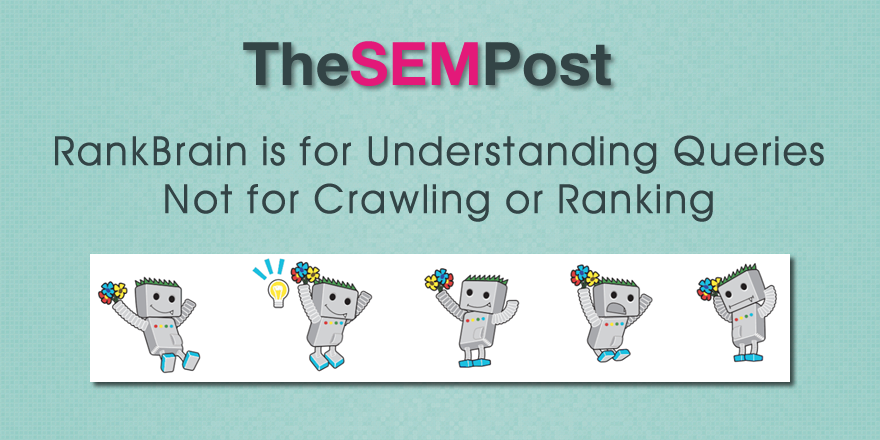 Ever since RankBrain first launched, there has been a lot of confusion over how exactly it impacts SEOs and site owners. While we know it has a greater impact on search queries that Google has never seen before, Gary Illyes from Google has cleared up some of the more popular misconceptions about RankBrain and how it affects some areas popularly connected to RankBrain such as crawling and ranking.
Ever since RankBrain first launched, there has been a lot of confusion over how exactly it impacts SEOs and site owners. While we know it has a greater impact on search queries that Google has never seen before, Gary Illyes from Google has cleared up some of the more popular misconceptions about RankBrain and how it affects some areas popularly connected to RankBrain such as crawling and ranking.
Lemme try one last time: Rankbrain lets us understand queries better. No affect on crawling nor indexing or replace anything in ranking
— Gary Illyes (@methode) March 18, 2016
The understanding queries part is well known right from the initial RankBrain launch. John Mueller was asked just this week about RankBrain and its relation to crawl budget, and he also confirmed RankBrain does not impact crawl budget either.
RainBrain is also particularly good at dealing with the 15% of search queries Google hasn’t seen before.
@MotyMalkov that's the whole point of a ranking change. Now you can actually rank for queries like [can I finish super mario WITHOUT help]
— Gary Illyes (@methode) March 18, 2016
He also clarifies that this means RankBrain helps on the types of negative queries that Google doesn’t often see.
@randfish I meant any ranking component. It does change ranking, e.g we're better at getting relevant results for negative queries
— Gary Illyes (@methode) March 18, 2016
@randfish to the best of my knowledge that's the case, yes. (I am on the search quality team, but not rankbrain, so I don't know EVERYTHING)
— Gary Illyes (@methode) March 18, 2016
This is pretty important, and many seem to be missing it. Illyes is saying that RankBrain isn’t making up any of its own algo signals – something many are wrongly assuming RankBrain does – when it is handling these types of queries, but it can weight existing signals to understand and answer queries better.
Illyes also said something similar to this once RankBrain became known, that RankRrain is not continually learning. And machine learning expert Jack Clark also said RankBrain is periodically re-trained, but it’s not learning on-the-fly. So it seems much less a factor in creating ranking signals, something many SEOs have been speculating recently.
Majid Bukhari says
Hi Jennifer,
That has clarified the confusion and made understanding batter – RB is not something new factor, it’s an addition to existing ranking signasl. Let me know if it;s not the case.
Thanks!
Best,
Paul Reilly says
RankBrain = Word2Vec just my 2c – https://www.mediaskunkworks.com/iGB_Aff_54_DecJan_p28-31.pdf
just my 2c – https://www.mediaskunkworks.com/iGB_Aff_54_DecJan_p28-31.pdf
Paul Reilly says
Further to the above article, Word2Vec, as the above article speculates to form the basis of RankBrain has already been superseded by an the Convolution Neural Network implementation detailed in the paper:: Dependency Based Embeddings for Sentence Classification Tasks (Alexandros Komninos & Suresh Manandhar)
PDF here: http://www-users.cs.york.ac.uk/~suresh/papers/dep_embeddings_naacl2016.pdf
A Fascinating topic Jennifer and an equally enjoyable read. Thanks.
Jennifer Slegg says
Thanks… I hadn’t seen this one yet (and I have read a ton of papers on it ever since Google initially confirmed RankBrain). Just some light Sunday reading
Jennifer Slegg says
I talked about the connections to Word2Vec (and Google’s response to the question I had about the connection) here: http://www.thesempost.com/rankbrain-everything-we-know-about-googles-ai-algorithm/
Paul Reilly says
Gif explains RankBrain’s word2vec algorithim here: https://twitter.com/paulreilly/status/711397493855145985
Enrico Altavilla says
I’m not sure about what Illyes said about the fact that RankBrain doesn’t use any new factor. If the algorithm produces a new mathematical representation of the query, in order to compare the query with the resources, it would be necessary to calculate a representation of each resource using the same methodology used to analyze the query. This new representation of each resource would count as a new resource signal.
Brien says
Does anyone know the stat on percentage of daily queries google gets that they have never seen before? I.e “negative queries” or “the long tail”.
Jennifer Slegg says
When they announced RankBrain, it was 15% that were never before seen queries.
http://www.thesempost.com/rankbrain-everything-we-know-about-googles-ai-algorithm/
Tom Buckland says
Don’t think rankbrain is all that to be honest. Understanding queries sure and the context behind those queries is pretty important obviously. But from a purely commercial point of view don’t think it matters.
For example “Lawyers in New York” and “Are there any Lawyers in New York”. Are both still just gonna show the lawyers. Same for any product and any services too.
Think the only thing that changes is informational and non-commercial SEO….. Just my thoughts.
Paul Reilly says
I’ve found that by understanding it’s purpose having recognised it’s existence has already proven crucial in diagnosing a recent client issue.
It involved a high value, query for a gambling site, once which the client’s site had become (due to language vectorisation) no longer a match for the query.
It had previously monetised that phrase by Google’s former failing to distinguish sufficient context.
Paul